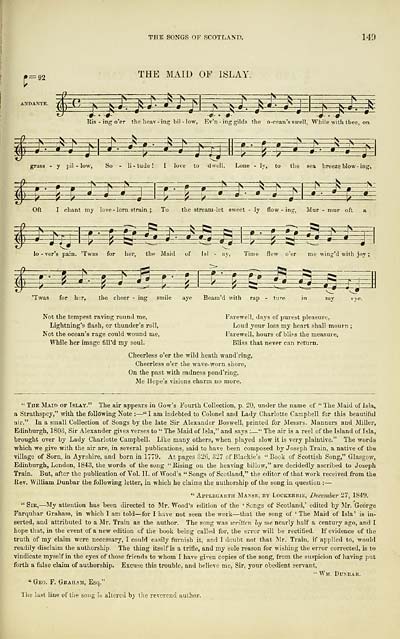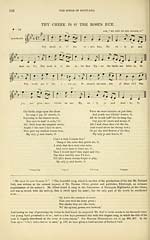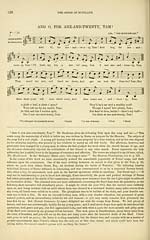Glen Collection of printed music > Printed music > Wood's edition of the songs of Scotland
(173) Page 149 - Maid of Islay
Download files
Complete book:
Individual page:
Thumbnail gallery: Grid view | List view

THE SONGS OF SCOTLAND.
149
: 92
3E
THE MAID OF ISLAY.
E£
^
#- . -#- »- • -0- -0- • -#-
Ris - ing o'er the heav-ing bil-low, Ev'n-ing gilds the o-cean's swell, While with thee, on
^iS^upB^^^i^i
m
grass - y pil - low, So - li-tude! I love to dwell. Lone - ly, to the sea breeze blow -ing,
S
Oft I chant my love - lorn strain ; To the stream -let sweet - ly flow - ing, Mur - mur oft a
S=P?
E 0~ M 4 -J— .
a — m-
S
E
S£
^=icS
lo - ver's pain. 'Twas for her, the Maid of Isl
*v,
Time flew o'er me wing'd with joy ;
#. — ,_-_g_ — fr- , E =l^ — ,-, — 0--\ — fr-=— » — ^ a ^=1^=^.==h
'Twas for her, the cheer - ing smile aye Beam'd with rap - ture in
my
eye.
Not the tempest raving round me,
Lightning's flash, or thunder's roll,
Not the ocean's rage could wound me,
While her image fill'd my soul.
Farewell, days of purest pleasure,
Loud your loss my heart shall mourn ;
Farewell, hours of bliss the measure,
Bliss that never can return.
Cheerless o'er the wild heath wand'ring,
Cheerless o'er the wave-worn shore,
On the past with sadness pond'ring,
Me Hope's visions charm no more.
" Tjie Maid of Tslay." The air appears in Gow's Fourth Collection, p. 20, under the name of " The Maid of Isla,
a Strathspey," with the folhJwing Note : — " I am indebted to Colonel and Lady Charlotte Campbell for this beautiful
air." In a small Collection of Songs by the late Sir Alexander Boswell, printed for Messrs. Manners and Miller,
Edinburgh, 1803, Sir Alexander gives verses to " The Maid of Isla," and says : — " The air is a reel of the Island of Isla,
brought over by Lady Charlotte Campbell. Like many others, when played slow it is very plaintive." The words
which we give with the air are, in several publications, said to have been composed by Joseph Train, a native of the
village of Sorn, in Ayrshire, and born in 1779. At pages 320, 327 of Blackie's " Book of Scottish Song," Glasgow,
Edinburgh, London, 1843, the words of the song "Rising on the heaving billow," are decidedly ascribed to Joseph
Train. But, after the publication of Vol. II. of Wood's " Songs of Scotland," the editor of that work received from the
Rev. William Dunbar the following letter, in which he claims the authorship of the song in question : —
" AprLEGAKTH Manse, by Lockekbie, December 27, 1849.
" Sib, — My attention has been directed to Mr. Wood's edition of the ' Songs of Scotland,' edited by Mr. George
Farquhar Graham, in which I am told— for I have not seen the work — that the song of ' The Maid of Isla' is in-
serted, and attributed to a Mr. Train as the author. The song was written by me nearly half a century ago, and I
hope that, in the event of a new edition of the book being called for, the error will be rectified. If evidence of the
truth of my claim were necessary, I could easily furnish it, and I doubt not that Mr. Train, if applied to, would
readily disclaim the authorship. The thing itself is a trifle, and my sole reason for wishing the error corrected, is to
vindicate myself in the eyes of those friends to whom I have given copies of the song, from the suspicion of having put
forth a false claim of authorship. Excuse this trouble, and believe me, Sir, your obedient servant,
" Wll. DUNBAK.
" Geo. F. Graham, Esq."
The last line of the song i* altered by the reverend author.
149
: 92
3E
THE MAID OF ISLAY.
E£
^
#- . -#- »- • -0- -0- • -#-
Ris - ing o'er the heav-ing bil-low, Ev'n-ing gilds the o-cean's swell, While with thee, on
^iS^upB^^^i^i
m
grass - y pil - low, So - li-tude! I love to dwell. Lone - ly, to the sea breeze blow -ing,
S
Oft I chant my love - lorn strain ; To the stream -let sweet - ly flow - ing, Mur - mur oft a
S=P?
E 0~ M 4 -J— .
a — m-
S
E
S£
^=icS
lo - ver's pain. 'Twas for her, the Maid of Isl
*v,
Time flew o'er me wing'd with joy ;
#. — ,_-_g_ — fr- , E =l^ — ,-, — 0--\ — fr-=— » — ^ a ^=1^=^.==h
'Twas for her, the cheer - ing smile aye Beam'd with rap - ture in
my
eye.
Not the tempest raving round me,
Lightning's flash, or thunder's roll,
Not the ocean's rage could wound me,
While her image fill'd my soul.
Farewell, days of purest pleasure,
Loud your loss my heart shall mourn ;
Farewell, hours of bliss the measure,
Bliss that never can return.
Cheerless o'er the wild heath wand'ring,
Cheerless o'er the wave-worn shore,
On the past with sadness pond'ring,
Me Hope's visions charm no more.
" Tjie Maid of Tslay." The air appears in Gow's Fourth Collection, p. 20, under the name of " The Maid of Isla,
a Strathspey," with the folhJwing Note : — " I am indebted to Colonel and Lady Charlotte Campbell for this beautiful
air." In a small Collection of Songs by the late Sir Alexander Boswell, printed for Messrs. Manners and Miller,
Edinburgh, 1803, Sir Alexander gives verses to " The Maid of Isla," and says : — " The air is a reel of the Island of Isla,
brought over by Lady Charlotte Campbell. Like many others, when played slow it is very plaintive." The words
which we give with the air are, in several publications, said to have been composed by Joseph Train, a native of the
village of Sorn, in Ayrshire, and born in 1779. At pages 320, 327 of Blackie's " Book of Scottish Song," Glasgow,
Edinburgh, London, 1843, the words of the song "Rising on the heaving billow," are decidedly ascribed to Joseph
Train. But, after the publication of Vol. II. of Wood's " Songs of Scotland," the editor of that work received from the
Rev. William Dunbar the following letter, in which he claims the authorship of the song in question : —
" AprLEGAKTH Manse, by Lockekbie, December 27, 1849.
" Sib, — My attention has been directed to Mr. Wood's edition of the ' Songs of Scotland,' edited by Mr. George
Farquhar Graham, in which I am told— for I have not seen the work — that the song of ' The Maid of Isla' is in-
serted, and attributed to a Mr. Train as the author. The song was written by me nearly half a century ago, and I
hope that, in the event of a new edition of the book being called for, the error will be rectified. If evidence of the
truth of my claim were necessary, I could easily furnish it, and I doubt not that Mr. Train, if applied to, would
readily disclaim the authorship. The thing itself is a trifle, and my sole reason for wishing the error corrected, is to
vindicate myself in the eyes of those friends to whom I have given copies of the song, from the suspicion of having put
forth a false claim of authorship. Excuse this trouble, and believe me, Sir, your obedient servant,
" Wll. DUNBAK.
" Geo. F. Graham, Esq."
The last line of the song i* altered by the reverend author.
Set display mode to: Large image | Transcription
Images and transcriptions on this page, including medium image downloads, may be used under the Creative Commons Attribution 4.0 International Licence unless otherwise stated. ![]()
| Special collections of printed music > Glen Collection of printed music > Printed music > Wood's edition of the songs of Scotland > (173) Page 149 - Maid of Islay |
|---|
| Permanent URL | https://digital.nls.uk/91339819 |
|---|
| Description | Scottish songs and music of the 18th and early 19th centuries, including music for the Highland bagpipe. These are selected items from the collection of John Glen (1833 to 1904). Also includes a few manuscripts, some treatises, and other books on the subject. |
|---|
| Description | The Glen Collection and the Inglis Collection represent mainly 18th and 19th century Scottish music, including Scottish songs. The collections of Berlioz and Verdi collected by bibliographer Cecil Hopkinson contain contemporary and later editions of the works of the two composers Berlioz and Verdi. |
|---|

